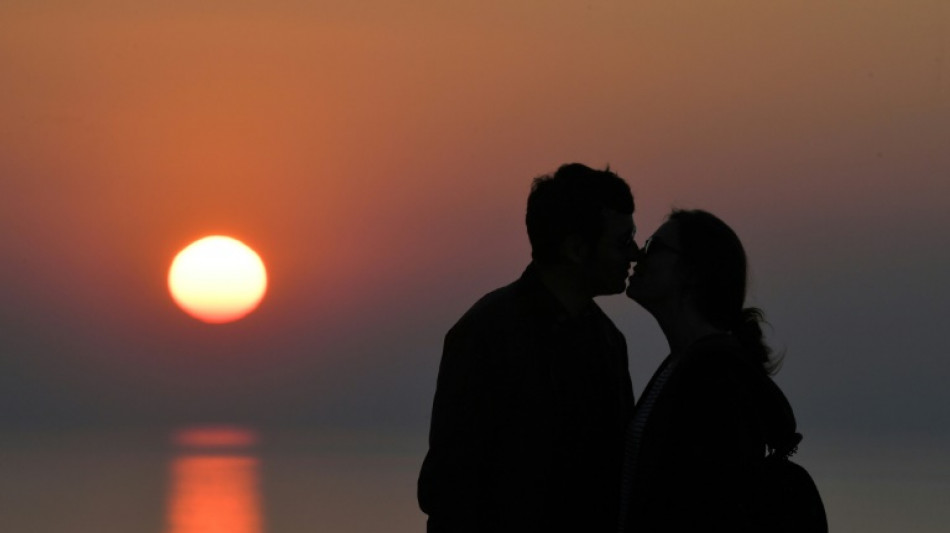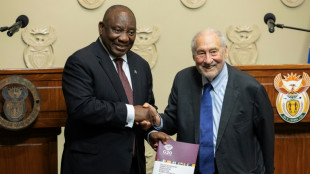
-
 Ex-Zimbabwe cricket captain Williams treated for 'drug addiction'
Ex-Zimbabwe cricket captain Williams treated for 'drug addiction'
-
Padres ace Darvish to miss 2026 MLB season after surgery

-
 Diaz hero and villain as Bayern beat PSG in Champions League showdown
Diaz hero and villain as Bayern beat PSG in Champions League showdown
-
Liverpool master Real Madrid on Alexander-Arnold's return

-
 Van de Ven back in favour as stunning strike fuels Spurs rout
Van de Ven back in favour as stunning strike fuels Spurs rout
-
Juve held by Sporting Lisbon in stalling Champions League campaign

-
 New lawsuit alleges Spotify allows streaming fraud
New lawsuit alleges Spotify allows streaming fraud
-
Stocks mostly drop as tech rally fades

-
 LIV Golf switching to 72-hole format in 2026: official
LIV Golf switching to 72-hole format in 2026: official
-
Manchester City have become 'more beatable', says Dortmund's Gross

-
 Merino brace sends Arsenal past Slavia in Champions League
Merino brace sends Arsenal past Slavia in Champions League
-
Djokovic makes winning return in Athens

-
 Napoli and Eintracht Frankfurt in Champions League stalemate
Napoli and Eintracht Frankfurt in Champions League stalemate
-
Arsenal's Dowman becomes youngest-ever Champions League player

-
 Cheney shaped US like no other VP. Until he didn't.
Cheney shaped US like no other VP. Until he didn't.
-
Pakistan edge South Africa in tense ODI finish in Faisalabad

-
 Brazil's Lula urges less talk, more action at COP30 climate meet
Brazil's Lula urges less talk, more action at COP30 climate meet
-
Barca's Lewandowski says his season starting now after injury struggles

-
 Burn urges Newcastle to show their ugly side in Bilbao clash
Burn urges Newcastle to show their ugly side in Bilbao clash
-
French pair released after 3-year Iran jail ordeal

-
 Getty Images largely loses lawsuit against UK AI firm
Getty Images largely loses lawsuit against UK AI firm
-
Cement maker Lafarge on trial in France over jihadist funding

-
 Sculpture of Trump strapped to a cross displayed in Switzerland
Sculpture of Trump strapped to a cross displayed in Switzerland
-
Pakistan's Rauf and Indian skipper Yadav punished over Asia Cup behaviour

-
 Libbok welcomes 'healthy' Springboks fly-half competition
Libbok welcomes 'healthy' Springboks fly-half competition
-
Reeling from earthquakes, Afghans fear coming winter

-
 Ronaldo reveals emotional retirement will come 'soon'
Ronaldo reveals emotional retirement will come 'soon'
-
Munich's surfers stunned after famed river wave vanishes

-
 Iran commemorates storming of US embassy with missile replicas, fake coffins
Iran commemorates storming of US embassy with missile replicas, fake coffins
-
Gauff sweeps Paolini aside to revitalise WTA Finals defence

-
 Shein vows to cooperate with France in probe over childlike sex dolls
Shein vows to cooperate with France in probe over childlike sex dolls
-
Young leftist Mamdani on track to win NY vote, shaking up US politics

-
 US government shutdown ties record for longest in history
US government shutdown ties record for longest in history
-
King Tut's collection displayed for first time at Egypt's grand museum

-
 Typhoon flooding kills over 40, strands thousands in central Philippines
Typhoon flooding kills over 40, strands thousands in central Philippines
-
Trent mural defaced ahead of Liverpool return

-
 Sabalenka to face Kyrgios in 'Battle of Sexes' on December 28
Sabalenka to face Kyrgios in 'Battle of Sexes' on December 28
-
Experts call for global panel to tackle 'inequality crisis'

-
 Backed by Brussels, Zelensky urges Orban to drop veto on EU bid
Backed by Brussels, Zelensky urges Orban to drop veto on EU bid
-
After ECHR ruling, Turkey opposition urges pro-Kurd leader's release

-
 UK far-right activist Robinson cleared of terror offence over phone access
UK far-right activist Robinson cleared of terror offence over phone access
-
World on track to dangerous warming as emissions hit record high: UN

-
 Nvidia, Deutsche Telekom unveil 1-bn-euro AI industrial hub
Nvidia, Deutsche Telekom unveil 1-bn-euro AI industrial hub
-
Which record? Haaland warns he can get even better

-
 Football star David Beckham hails knighthood as 'proudest moment'
Football star David Beckham hails knighthood as 'proudest moment'
-
Laurent Mauvignier wins France's top literary award for family saga

-
 Indian Sikh pilgrims enter Pakistan, first major crossing since May conflict
Indian Sikh pilgrims enter Pakistan, first major crossing since May conflict
-
Former US vice president Dick Cheney dies at 84

-
 Fiorentina sack Pioli after winless start in Serie A
Fiorentina sack Pioli after winless start in Serie A
-
Oscar-winning Palestinian films daily 'Israeli impunity' in West Bank


First kisses may have helped spread cold sore virus
The modern strain of the virus that causes cold sores has been traced back to around 5,000 years ago, with researchers suggesting its spread could have been propelled by the emergence of kissing.
Around 3.7 billion people -- the majority of the world's population -- have a life-long infection of the HSV-1 virus behind facial herpes, according to the World Health Organization.
But despite its ubiquity, relatively little has been known about the history of this virus, or how it spread throughout the world.
So an international team of researchers screened the DNA of teeth in hundreds of people from ancient archaeological finds.
They found four people who had the virus when they died, then sequenced their genomes for research published in the journal Science Advances on Wednesday.
"Using these reconstructed genomes, we were able to determine that the variations of modern strains all trace back to some time in the late Neolithic, early Bronze Age," said the study's co-senior author Christiana Scheib of Cambridge University.
"This was a bit surprising because it has been assumed that herpes is something that has co-evolved with humans for a very long time," she told AFP.
- Never been kissed -
She said that was still true: all primate species have a form of herpes and humans likely had a strain when they first left Africa.
But the research indicated that those earlier strains were replaced by the modern form around 5,000 years ago.
So what brought about that change? The researchers suggested two theories.
Around 5,000 years ago was a time of great migration from Eurasia into Europe, and that spread could have affected the virus.
The other theory? That was around the time when people starting romantically kissing each other.
"That is definitely one way to change the transferability of a herpes virus," Scheib said.
The virus is normally passed by a parent to their child, but kissing would have given it a whole new way to jump between hosts, she said.
"There is some textual evidence starting to show in the Bronze Age of kissing between romantic partners," Scheib said.
- 'Far grander' -
The researchers said the earliest known record of kissing was a manuscript from South Asia during the Bronze Age, suggesting the custom may have also migrated from Eurasia into Europe.
Kissing "is not a universal human trait," Scheib pointed out, emphasising that it is difficult to trace exactly when it began -- or if it is definitively linked to the spread of HSV-1.
Around 2,000 years ago, the Roman Emperor Tiberius was believed to have attempted to ban kissing at official functions to prevent the spread of herpes.
Co-senior study author Charlotte Houldcroft, also from Cambridge, said that a virus like herpes evolves on a "far grander timescale" than Covid-19, which the world has watched mutate in a matter of months.
"Facial herpes hides in its host for life and only transmits through oral contact, so mutations occur slowly over centuries and millennia," she said.
"Previously, genetic data for herpes only went back to 1925," she added, calling for more "deep time investigations" of viruses.
"Only genetic samples that are hundreds or even thousands of years old will allow us to understand how DNA viruses such as herpes and monkeypox, as well as our own immune systems, are adapting in response to each other."
O.Lorenz--BTB




